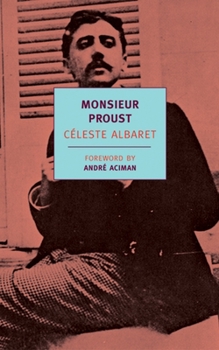Monsieur Proust
Select Format
Select Condition 
Book Overview
C leste Albaret was Marcel Proust's housekeeper in his last years, when he retreated from the world to devote himself to In Search of Lost Time . She could imitate his voice to perfection, and Proust... This description may be from another edition of this product.
Format:Paperback
Language:English
ISBN:1590170598
ISBN13:9781590170595
Release Date:October 2003
Publisher:New York Review of Books
Length:387 Pages
Weight:0.70 lbs.
Dimensions:1.2" x 4.9" x 7.9"
Customer Reviews
2 ratings
Monsieur Marcel
Published by Thriftbooks.com User , 15 years ago
'Monsieur Proust' is based on tape recorded interviews with Marcel Proust's personal assistant/chambermaid Celeste Albaret, made in the 1970's, several decades after Marcel's death. The text has (probably) been altered from the spoken word, and is very clear, consistent and readable. Celeste tells in detail about the last ten years of Proust's life, which he mostly spent in his bed, curtains blocking the light and a layer of cork shutting out noises - writing on 'À la recherche du temps perdu'. Celeste had to attend to all of Prousts routines and whims: he usually woke up late in the afternoon, ate only a croissant and some coffee and sometimes went out in the middle of the night to attend parties, and Celeste had to stay awake and let Marcel in cause he didn't use a key. As time went by the relationship between Marcel and Celeste became closer, and he became more and more dependent on her. 'Monsieur Proust' is not only about Marcels charming eccentricities. It also gives a glimpse of Paris in the late 1910's, and some insight into Proust as a writer, the relationship between his writing and memory and the demise of the old society. And the debacle between Proust and Gallimard and Gide when 'Du côté de chez Swann' was first refused (something Proust made them regret). Also, Celeste criticizes some of the established views of Proust given by other commentators, his homosexuality for instance. I don't know how trusted Celeste can be as a narrator, and what may be additions made by the publisher, but 'Monsieur Proust' is a very captivating read.
Intimate Portrayal of Proust
Published by Thriftbooks.com User , 20 years ago
If you're a writer, you can't help but feel curious about the habits of other writers -- particularly the great ones, the writers you admire. How and when did they work? How did they accomplish their masterpieces? Of course, a cross-section of famous writers only demonstrates that there is no one way of working. Hemingway got up at dawn and wrote until lunch or so. Kafka had supper late in the evening and then began to write after ten or eleven o'clock, when everyone else was going to bed. Evidently day is as good as night, if you have talent and the will to write.One of the more unusual schedules had to be that of Marcel Proust. Unlike Kafka, who wrote at night even though he had to get up in the morning to go to the insurance firm where he worked, Proust was a man of independent means and was thus able to maintain as irregular a schedule as he liked. Or rather, his schedule was highly regularized, it just wasn't exactly "normal." Typically, Proust woke up around four in the afternoon -- if he even really slept that much, which is an open question. Upon awakening, he would "smoke," which was his term for a fumigation process meant to relieve his asthma. Afterward he would drink one or sometimes two cups of cafe au lait prepared according to very stringent requirements. Sometimes he would eat a croissant, sometimes not. If he were staying home for the evening, as he often did in the years he was writing A la Recherche du temps perdu, he might begin work right after this "breakfast." If he was going out, he might not return until the middle of the night. Arriving home at, say, three in the morning, he might spend a few hours telling his chambermaid all about his evening -- and then, at perhaps six in the morning, after having been up all night, he would begin to write. What's more, he always wrote in bed. It really gives new meaning, when you consider this, to the famous opening line of his masterwork: "Longtemps je me suis couche de bonne heure." For a long time I went to bed early -- this was written by a man lying in bed after having been up all night.The chambermaid who was Proust's nocturnal confidante during the last decade of his life -- precisely when he was writing his masterwork -- outlived him by more than sixty years. (Proust died in 1922, Ms. Albaret in 1984). For the bulk of those years, she maintained a strict silence about her former employer, honoring Proust's own sense of privacy. But finally, late in life, she felt the need to set the record straight and thus agreed to be interviewed for this "as told to" memoir. This is fortunate for fans of Proust, and for fans of literature in general, for her memoir is as intimate a portrait as you can find of any writer. It is the kind of view you produce of a person whom you love, respect, admire, but also serve in the most minute and detailed capacities. You can practically smell Proust's underwear in this book -- which is not to say that it's a lurid tell-all, because it isn't. Ms. Albar




